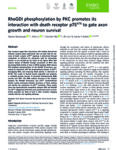Three years after joining our group at the Karolinska Institute, Tingqing Guo moves to Singapore to lead our metabolism programme in NUS.
Tingqing Guo got his PhD at the Shanghai Institute of Biochemistry and Cell biology. His first postdoc was with the lab of Alexandra McPherron at NIDDK, NIH. His work at the McPherron lab focused on the role of myostatin in insulin sensitivity and fat deposition resulting in an influential paper in the journal Diabetes. During his tenure at our KI group, Tingqing spearheaded investigations on the role of TGF-beta superfamily receptors ALK4 ALK7 in metabolic regulation, with an emphasis on adipose tissue differentiation and physiology. He will continue those studies at our NUS lab in Singapore.
Samuel Ong has worked as a lab technologist in NUS for many years. He will be assisting our group with lab administration issues on a part-time basis. We welcome his help!
Liz Lim obtained a PhD at the Institute for Molecular and Cell Biology A*STAR, Singapore, under the supervision of Dr. Sohail Ahmed for her work on Cdc42 in filopida formation. She subsequently did postdoctoral studies at DUKE-NUS Graduate Medical School Singapore under the direction of Dr. Marc Fivaz during which she investigated alterations in axonal transport in neurons compromised in DISC1 function. She joins the group with an extensive experience in live cell imaging and several of the most important “F-techniques”, including FRET, FRAP and FLIM. Her task will be to unravel mechanisms of receptor activation and intracellular signal compartmentalization and propagation in death receptors, including the p75 neurotrophin receptor.
Jason Tann obtained a Bachelor degree in Bioengineering from the National University of Singapore in 2012. He has expertise in diverse cell culture techniques, including primary neurons and stem cells, from several research projects conducted at the Department of Bioengineering, NUS, and the ASTAR/Duke-NUS Neuroscience Research Partnership. He joins the group to assist with primary neuron culture studies to understand death receptor signaling in health and disease.
Julia Simon Martin obtained a PhD in Molecular Biology in 2011 from the Universidad Autonoma de Madrid, Spain under the direction of Drs. Luis Miguel Garcia-Segura and Maria-Angeles Arevalo, for discoveries concerning the actions of Neurogenin 3 on dendrite and synapse formation in hippocampal neurons. She is joining the NUS team to unravel the downstream signal propagation mechanisms underlying the actions of neuronal death receptors in health and disease.
Postdoc/Research Fellows are currently being recruited to the new NUS laboratory. We are seeking talented, innovative and enthusiastic researchers with a PhD awarded within the last 10 years.
Systemic Cell Biology
The successful candidate will have a strong background in studies of cell signaling dynamics using biopysics and cell imaging methods such as fluorescence resonance energy transfer (FRET) and fluorescence lifetime imaging microscopy (FLIM), biosensors, total internal reflection fluorescence (TIRF), anisotropy and related time-resolved spectroscopy methods. Strong expertise in cell and molecular biology techniques is also essential.
iPS Cell Biology
The successful candidate will have a strong background in studies involving the generation and differentiation of Induced Pluripotent Stem Cells (iPSCs). The aim of the project is the characterization of death receptor signaling in human neurons derived from patients with neurodegenerative diseases. Additional experience in cell signaling and neuronal cell biology will also be an important asset.
Drug Discovery
The successful candidate will have a strong background in studies of intracellular signaling involving microscopy techniques, gene reporter assays and biochemical assays. The aim of the project is the identification of inhibitors to death receptor signaling taking advantage of recent knowledge on their mechanisms of activation and downstream signal propagation. Strong expertise in cell and molecular biology techniques is also essential.
Applications, including CV, list of publications and statement of future interests should be sent to Prof. Carlos Ibanez  . Applicants should arrange to have at least two confidential letters of reference sent independently by referees to this email address. . Applicants should arrange to have at least two confidential letters of reference sent independently by referees to this email address.
Funding is available for an initial period of 2 to 3 years, starting any time during 2013.
Deadline for the application is February 15, 2013.
A Lab Manager is currently being recruited to our NUS laboratory. The successful candidate will be a dynamic, service-minded person, with a strong research background in cellular or molecular biology, neurobiology, metabolism and/or mouse genetics. He/she will assist the group with managing and organizing lab routines, protocols, orders, equipment and reagents. He/she will also have a strong presence in the laboratory by conducting research together with other lab members or independently.
Work at the laboratory will focus on understanding the functions and �signaling mechanisms of neuronal growth factors and their receptors in neural development, �injury responses and metabolic regulation, for the development of �better therapies to diseases of the nervous system and metabolism.
Applications should be sent by email before January 31 to  . .
Cell Reports publishes today our latest paper describing a structure-function map of the death domain of the p75 neurotrophin receptor (Charalampopoulos et al. 2012)
Structural determinants underlying signaling specificity in the tumor necrosis factor receptor superfamily (TNFRSF) are poorly characterized and it is unclear whether different signaling outputs can be genetically dissociated. The p75 neurotrophin receptor (p75NTR), also known as TNFRSF16, is a key regulator of trophic and injury responses in the nervous system. In this paper, we describe a genetic approach to dissect p75NTR signaling and decipher its underlying logic. Structural determinants important for regulation of cell death, NF-kB and RhoA pathways were identified in the p75NTR death domain. Pro-apoptotic and pro-survival pathways mapped onto non-overlapping epitopes, demonstrating that different signaling outputs can be genetically separated in p75NTR. Dissociation of JNK and caspase-3 activities indicated that JNK is necessary but not sufficient for p75NTR-mediated cell death. RIP2 recruitment and RhoGDI release were mechanistically linked, indicating that competition for DD binding underlies cross-talk between NF-kB and RhoA pathways in p75NTR signaling. These results provide new insights into the logic of p75NTR signaling and pave the way for a genetic dissection of p75NTR function and physiology.
Read the full paper HERE.
Gao Jian Fang has a Bachelor’s degree in pharmaceutical engineering from Beijing University of Chinese Medicine and a Master’s degree in medicinal chemistry from Peking Union Medical College, Tsinghua University. Before joining our group, she worked as a Research Assistant at the Department of Anatomy of the Yong Loo Lin School of Medicine, NUS, on a project aimed at identiying therapeutic strategies to inhibit microglia-mediated neuroinflammation and cognitive impairment after brain trauma.
Kazuhiro Tanaka obtained a PhD in Pharmacy in 2005 from the Graduate School of Pharmaceutical Sciences, Osaka University, Japan, under the direction of Prof. Akemichi Baba, for studies on PACAP signaling and its effects on behavior. He subsequently did postdoctoral studies on astrocyte biology and patophysiology under Dr. Yutaka Koyama at Osaka-Ohtani University and on stroke models under Prof. Ong Wei Yi at the Department of Pharmacology, National Uniersity of Singapore. His new studies will focus on elucidating the physiological functions of death receptor signaling in the developing and injured nervous system using mouse models carrying mutations in the p75ntr gene.
Our NUS lab website goes live today after weeks of preparation. It will soon grow with more information about new lab members as they begin joining the group. Make sure to check out the site again in the coming weeks.
Lin Zhi received a PhD in Protein Structural Biology in 2006 from the Department of Biological Sciences, National University of Singapore, under the direction of Daiwen Yang for studies on silk protein structure and engineering. He joins the group as Senior Research Fellow to work structure determination and functional characterization of the death domain of the p75 neurotrophin receptor in complex with downstream signaling interactors.
PhD students, postdoctoral fellows and lab technicians are being �recruited for the new NUS laboratory.
Work at the laboratory will focus on understanding the functions and �signaling mechanisms of neuronal growth factors in neural development, �injury responses and metabolic regulation, for the development of �better therapies to diseases of the nervous system and metabolism.
Candidates with expertise in cellular, molecular or structural biology, neurobiology, metabolism and mouse genetics are encouraged to apply.
For contact and information, please write to Carlos Ibanez at  . .
|
|
|
Warning: Undefined array key "full_width_footer" in /customers/2/6/6/carlosibanezlab.se/httpd.www/NUS/wp-content/themes/atahualpa_3723/footer.php on line 93




